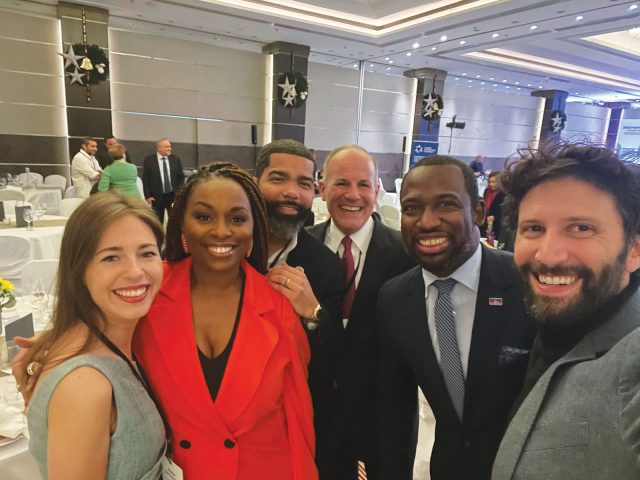
By Basya Gartenstein, Director, JCRC
Between Nov. 30 and Dec.1, 60 municipal leaders from Israel, the USA, and Europe gathered with 150 key representatives in Athens, Greece, for the 2022 Mayors Summit Against Antisemitism.
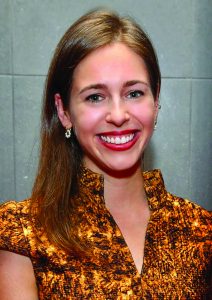
It was an honor to represent the Richmond delegation along with Mayor Levar Stoney, his Chief Administrative Official Reginald Gordon, and the Chair of the JCRC Amy Melnick-Scharf.
Jewish practice and ritual are critical to understanding the Jewish people. Therefore, with the support of the American Jewish Joint Distribution Committee (JDC) and the Jewish community of Athens, I organized a Shabbat dinner for Mayor Stoney, the Rabbi of Athens, Rabbi Gabriel Negrin; and the president of the Greek community David Saltiel.
The new CEO of the American Jewish Committee (AJC) was visiting, and the dinner evolved into a 20-person Shabbat at the residence of the U.S. Ambassador to Greece, Ambassador George James Tunis.
The summit was hosted by the City of Athens and chaired by its Mayor, Kostas Bakoyannis, in partnership with the Jewish Federations of North America (JFNA), the Combat Antisemitism Movement (CAM), and Center for Jewish Impact (CJI).
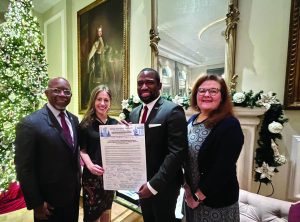
Amy, the mayor, and I, attended because of the national and local trends of inclining antisemitism and to address the normalization of hate speech and crimes. While Jews make up less than 2% of the U.S. population, 2020 FBI hate crime statistics show that nearly 60% of all religious bias hate crimes target Jews.
In Virginia, there has been a proliferation of incidents in Richmond. The source of these attacks has consistently been white supremacists, expressed in propaganda and vandalism. Hatred toward Jews is most insidious in its contradictions – calling Jews communists and capitalists in one breath is a prime example.
Throughout Virginia, including Richmond, that phenomena has manifested in flyers claiming that “Kanye West was right about the Jews” controlling Hollywood with their money, and in the same week, flyers claiming that Putin’s communism is a Jewish scheme.
We are seeing what Michael Paul Williams – Pulitzer Prize- winning journalist and columnist from the Richmond Times-Dispatch – calls “a tolerance for intolerance.”
The summit paired theoretical problems – such as the multi-faceted and morphing nature of antisemitism as well as indifference – with practical solutions. It was held with the knowledge that local elected officials are most posed to impact change.
Though antisemitism and anti-Judaism in Europe manifest differently than in the USA, and the antisemitism of Beverly Hills is not the hatred and bias Jews face in Richmond, challenges thrive and fester in isolation.
Speaking with municipal leaders and seeing what strategies and synergies they had as well as why they differed in approach (at times) was impactful.
Our mayor, Levar Stoney, received a standing ovation after his speech at the opening ceremony of the summit. He bravely spoke from his position as a Black mayor in the former capitol of the confederacy about the intersection and normalization of antisemitism and antiblackness.
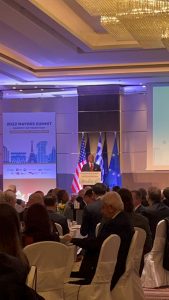 He built on the words of Mayor Eric Adams of New York: “if you take a frog and put it in a pot of hot water it would jump out right away. If you place a frog in cool water and turn up the temperature just slightly it would stay, there until it boils itself to death. That is where we are with antisemitism […] the temperature is increasing ever so slightly that we have allowed it to normalize in every part of our lives and we have become accustomed to it.”
He built on the words of Mayor Eric Adams of New York: “if you take a frog and put it in a pot of hot water it would jump out right away. If you place a frog in cool water and turn up the temperature just slightly it would stay, there until it boils itself to death. That is where we are with antisemitism […] the temperature is increasing ever so slightly that we have allowed it to normalize in every part of our lives and we have become accustomed to it.”
Mayor Stoney defined antisemitism as “hate, period.” He noted that the Black and Jewish communities are being pitted against one another to serve those who harbor virulent hate toward both communities.
Timely work is happening in Richmond with Initiatives of Change (IofC) whose leaders recently convened the Black and Jewish communities at the Virginia Holocaust Museum to learn about Hitler using Jim Crow laws to inspire his discriminatory legal system against Jews.
Our communal partner, Allan Charles-Chipman, Executive Director of IofC, approached the JCRC immediately when celebrities started normalizing dangerous notions about Jews in condemnation. He described racism and antisemitism as sides of the lung of white supremacy. If we deal with only one side, the lung recovers. That is not to put an “equal sign” between two distinct histories and systemic challenges, but it is the affirmation that they are intimately interwoven.
As many know, the governor’s Commission on Combating Antisemitism in Virginia released its report in early December.
The nearly 40-page report includes significant parallels to the approach of Dr. Felix Klein, the German Special Envoy for Combating Antisemitism.”
Data collection, education, a culture of awareness, security, and preventative action, and empowering a Jewish future were all features enumerated.
The Antisemitism Commission and municipal leaders from around the world agree on one thing – Jews need to be represented and empowered. One way that this will take shape is through American Jewish Heritage month this May – a suggestion in the Commission report and of the summit organizers.
We look forward to working hand-in-hand with the mayor and our various partners in local counties to celebrate Jewish life and a Jewish future.
We just celebrated Chanukah, a public testament to Jewish survival. Most Jewish holidays are inward facing, but on this holiday, we are commanded to place our menorahs on our front doorstep or in a window. It is a time that we ask others to bear witness to light in darkness despite relentless persecution.
Our mayor just celebrated this notion with us through his Chanukah candle lighting ceremony that took place on Dec. 19th at 4:30 p.m. at City Hall.
One cross-cutting aspect our Antisemitism Commission has not focused on is trauma- informed work based on the point of view of the victims of hate – something that Germany has emphasized and seen success with.
This approach allows those who are traumatized to be seen and process their distress, and ensures that officials and institutions combatting antisemitism inform their work with the lens of the vulnerable.
People respond differently to trauma, something that most Jews through epigenetics carry in their bodies.
Though many applied, we understand the Antisemitism Commission did not accept members from all political leanings – the center or left – of the Jewish community. They too have a story to be told. Moreover, in our Jewish community, we need to hear the fears and concerns of one another. In a time of unprecedented hate being leveled at the Jewish community, we have significant wisdom to pass on to each other.
There are fears and pain to be recognized. Without that recognition it is impossible to truly be secure.
No community is a monolith, and oversimplifying the Jewish community into one political party (only Republicans or Democrats) is inaccurate.
Simplifying Black Jewish relations into good times or bad times would ignore essential grievances as well as laudable moments. All voices must be accounted for when representing these troubling matters. Ignoring is not constructive, and silence is the very complicity we must call out. We cannot silence our own.
Before the conference started, I had a moment to visit the Acropolis. At its foot are ruins that historians believe include the floor of a synagogue dating back to the 3rd Century CE. The juxtaposition was potent.
The bedrock of democracy parallels the literal base of Jewish diasporic history. Jewish people have inhabited Athens since the 4th Century BCE, fashioning their own distinct practices and traditions as part of a diverse Jewish diaspora.
These Romaniote Jews are an essential part of our history, and that diversity is integral to democracy and thriving societies. Hatred of diversity undermines democracy.
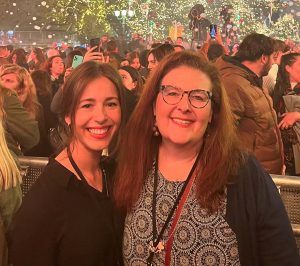 The lesson that representation matters is more important than ever. The Jewish community is anything but homogeneous, and that is at the root of our textual and lived tradition. The notion we are all of a piece, has led to inaccurate generalizations that feed rampant stereotypes we hear daily. In the Jewish podcast Unorthodox, they joke that instead of pressuring celebrities who have spouted Jew-hatred to learn about the Holocaust, they ought to just attend a communal board meeting. Hearing the debates over decisions large and small would cure anyone of the notion that “the Jews” are a unit ready to take over the world.
The lesson that representation matters is more important than ever. The Jewish community is anything but homogeneous, and that is at the root of our textual and lived tradition. The notion we are all of a piece, has led to inaccurate generalizations that feed rampant stereotypes we hear daily. In the Jewish podcast Unorthodox, they joke that instead of pressuring celebrities who have spouted Jew-hatred to learn about the Holocaust, they ought to just attend a communal board meeting. Hearing the debates over decisions large and small would cure anyone of the notion that “the Jews” are a unit ready to take over the world.
Those who actively reduce Jewish diversity, divide us. It is unity and not uniformity that proves to be our greatest asset as a people. Recognition of this lesson needs to inform the survival of our Jewish community and our inter-religious, multi-racial, and political partnerships. That is why our Oral Torah – the Talmud – rarely presents consensus on any topic. We need security and safety. Squashing our diversity risks Jewish survival and the foundation of our democracy.
To read the full Antisemitism Commission report,visit here.
To reach out to me, email bgartenstein@jewishrichmond.org.




